5 High School Organizations Offering To-And-From Japan Youth Programs
Start Your Study Abroad Experience Earlier In Life
Do you have a teen at home who wants to explore the world and can’t wait until university? Here's what you can do.
Imagine the benefits of having your child spend a semester in Iceland, a winter in Latvia, a summer vacation in Malta or graduating from a U.S. high school — or the opposite, 10 months at a Japanese high school while living with a local host family. While many parents tend to encourage their children to wait for early adulthood to start their foreign adventures, spending time away from home as a teen has its own undeniable benefits — learning to adapt to different families, to compromise, and not call mom every time they don’t understand the teacher — can be just a few of them.
While choices are abound (Yes, there are millions of private companies that would organize anything you wish), what sets the following Japan-based organizations apart is their supply of local counselors and support staff in both the student’s home country and destination to help smooth any problems. All five organizations have programs that offer a homestay and local school enrollment for a certain period of time both in Japan (inbound) for foreign students and from Japan (outbound) for Japanese or foreign students based in Japan. Here’s a grasp of what they offer!
1. AFS
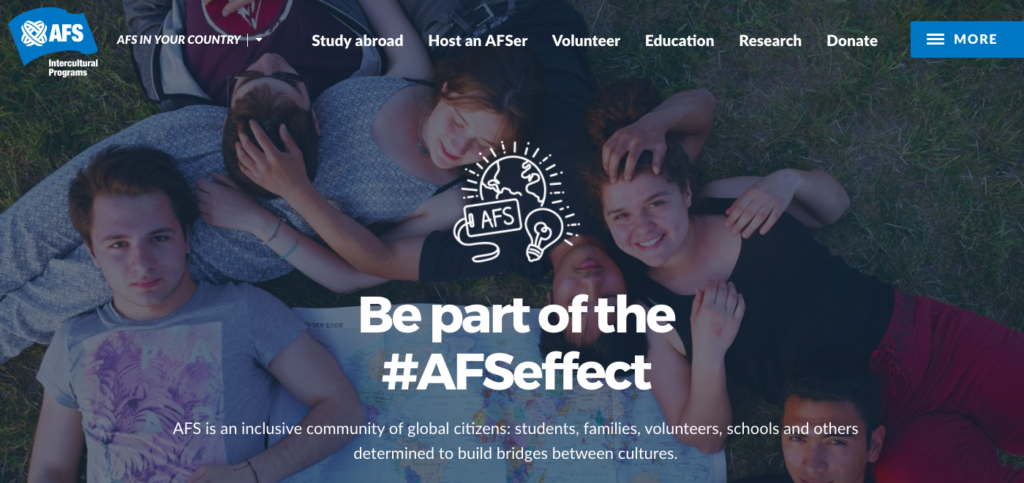
One of the oldest and best-known study abroad organizations in Japan, the AFS network expands to nearly 100 countries, including rarer destinations, such as Panama, Slovakia, Iceland, and Latvia, as well as a number of English-speaking nations.
Inbound
AFS runs three programs for inbound students coming from partner countries. The “Culture & School Life” program offers a two to three weeks of studying basic Japanese during a stay at a local dormitory that includes some activities with students at a local high school. The “Summer Language Study” program is one or two months and includes daily Japanese language classes. The most extensive “High School Program” invites inbound students to spend either a year or a semester living with a Japanese host family and attending a local high school as a study abroad student.
Outbound
The organization’s outbound programs include a “Short-Term Study Abroad,” a up to one month of studying abroad, a “One-Year Study Abroad,” which has Japanese students stay with foreign host families and attend local high schools, or the “Full-Fee Study Abroad,” in which participants decide the length of their study abroad and the location within their chosen country in-line with their own study goals.
2. EF

EF stands for “Education First” and this organization’s emphasis is on language training and academic achievement. EF says it guarantees students will advance one language level every six weeks of a course.
Inbound
EF has two main inbound programs: the “Language Courses Abroad” and the “Academic Year Abroad.” The former is a group program that brings teenagers from around the world together for anywhere from a fortnight to 24 weeks. Choose between the general course or the intensive one, which EF describes as being for those who want to learn a language as quickly as possible, such as for professional or academic purposes. Select dormitory accommodation or a homestay. The latter is a program of six, nine or 11 months offering an intensive or general course in Japan.
Outbound
The organization’s outbound programs are extensive, as well. Japanese students (or such attending a Japanese high school) can use the “Language Courses Abroad and Academic Year Abroad” program to visit English-speaking countries in Europe, or South Africa and Singapore. In the “Group Study Abroad Program,” a Japanese staff member accompanies the group to an English-speaking country during spring or winter vacation. Students from around the world study together at the destination. The “High School Study Abroad Program” has students attend a local school in England, Ireland or the U.S. for a year, during which the stay with host families.
The “EF Academy” is an international boarding school program under which students can graduate from a high school in the U.K. or U.S., and the “University Preparation Abroad” has students spend from six to nine months learning the academic and language skills needed for university study in an English-speaking country.
JFIE
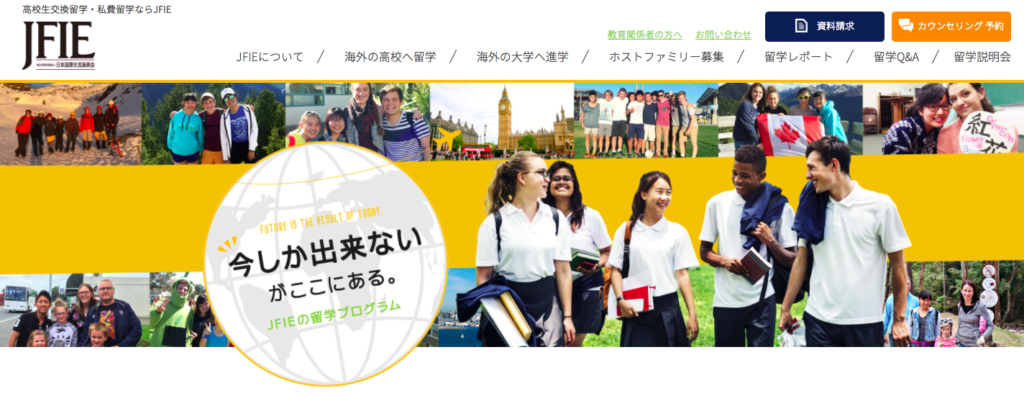
Inbound
Founded in 1992, the Japan Foundation for Intercultural Exchange is also one of the best-known organizations in Japan that works with affiliates in the U.S., Canada, New Zealand, Australia, France, Finland and the U.K. to arrange study programs in Japan, which usually will have a foreign student enroll in a Japanese high school for a year (or a shorter term) during which time they will be living with a local host family.
Outbound
JFIE also has two main outbound programs, ranging from a 10-month homestay in an English-speaking country, attending a local school, and the “Fee-Paying Exchange Program,” which allows students to customize their program abroad by selecting the school they will attend and a host family or dormitory stay. The program allows more freedom in focusing on one’s study goals – including choosing between sports or art schools – for as little as one semester or up until graduation.
WYS
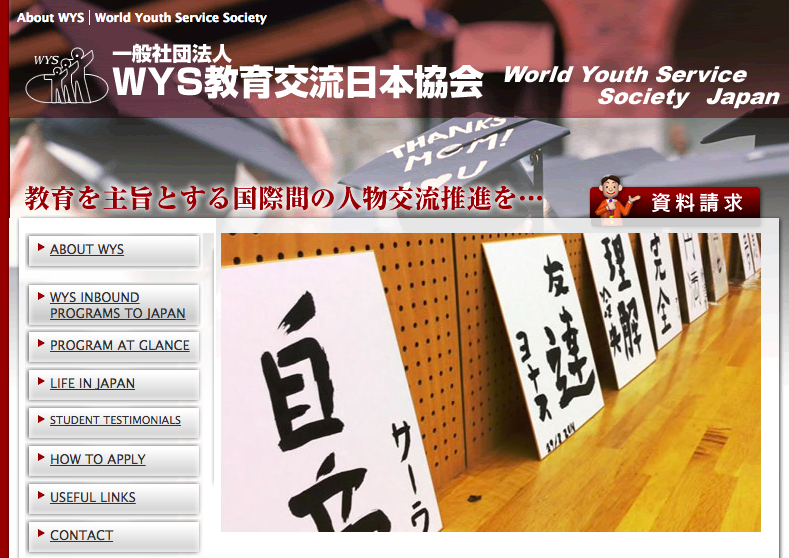
Students on World Youth Service programs usually stay with a host family and attend a local school throughout Japan, where their tuition fees are waived. WYS accepts inbound students from over 10 countries twice a year, in April and September.
Inbound
For its “To Japan” programs, WYS offers four programs that differ according to the length of stay. No visa is required for short programs that last up to three months. The “Semester Program” runs for either four or five months and the “Academic Year Program” is a 10-month course. Applicants should have good English skills and at least basic understanding of Japanese, including the basic ability to read and write hiragana and katakana.
Outbound
WYS organizes programs from Japan in 10 countries abroad, including the USA, Germany, France, Belgium, Norway, New Zealand and more. The “Short-Term Program” is a short homestay and local school attendance of either three or four weeks, for junior high and high school students. The “Exchange Student Program” is a 10-month to a full year program. In addition, there is also the “F-1 Visa U.S. Exchange Program,” designed for students who want to visit the U.S.A. but missed nabbing a spot in the Exchange Student Program (for reasons like, hm, grades and things). This has less stringent academic and English proficiency requirements and can be used either before or after a stay on the other one-year exchange course. Third-year high school students can use this program to study for a U.S. high school diploma. The “Self-Funded Study Abroad Program” allows students to choose from a period of one to three years, meaning they can graduate from a public high school in either Canada or New Zealand, or a private one in the U.K.
YFU
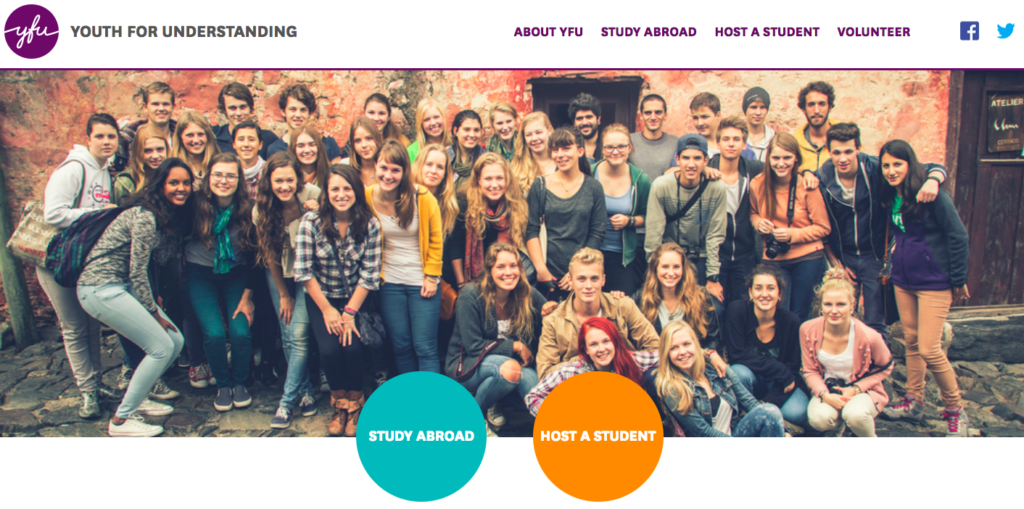
Inbound
Inbound students on Youth For Understanding (YFU)’s programs also stay with a host family and attend a local high school and are typically placed in small towns or suburban areas. The programs that YFU runs differ according to the participant’s home country, so use this website to find information from your local YFU branch.
YFU generally requires no previous Japanese language study for its inbound programs and allows students to experience Japan in a six-week stay starting in mid-June on the “Summer Program” or the “One-Year Study Abroad” course, which kicks off in March.
Outbound
For its outbound programs, YFU offers the choice of 19 destinations under the “One-Year Study Abroad” program.
Things to keep in mind
The difference between “regular program fees” and “fully paid programs” in most cases refers to the students’ abilities to select schools and host families. The regular fee programs will on most occasions have the respective organization select the school and host families through a local partner organization in each host country. The fee-paying programs will have the students do this, but are on the average significantly more expensive. For actual program fees, please consult each organization.
While most organizations don’t require prior knowledge of Japanese, it is recommended to come to Japan (and go to other countries) with at least some kind of linguistic preparation. This will reduce the culture shock and enhance the overall experience!
For more information about studying abroad or in Japan, see each organization’s website or the Japanese government-launched Tobitate program for Japanese high school students or foreign students holding a permanent residency and attending a Japanese high school.
For students wishing to study Japanese at a Japan-based language school, see GaijinPot’s Student Placement Program.












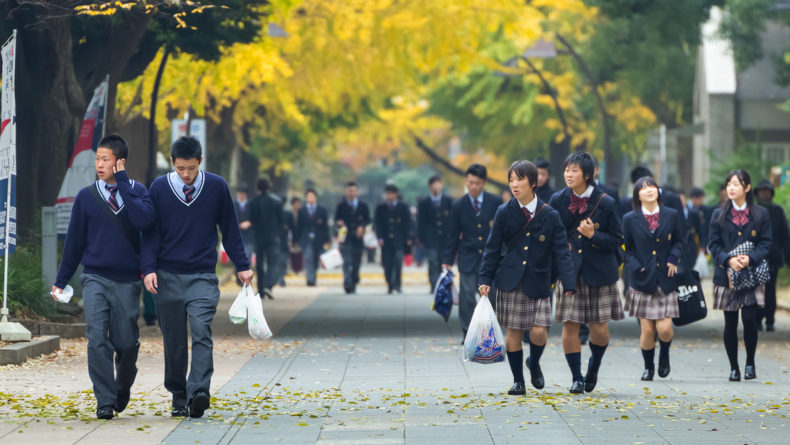

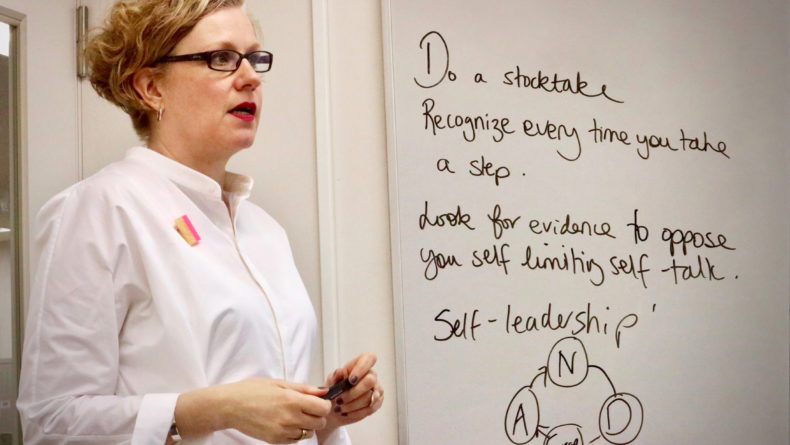
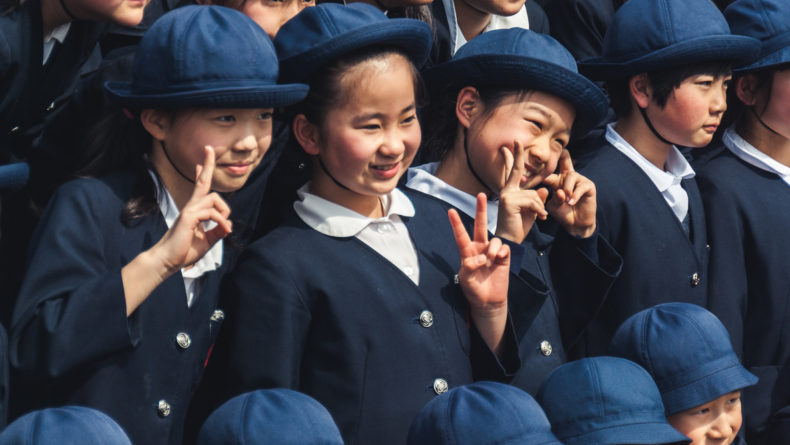
Leave a Reply